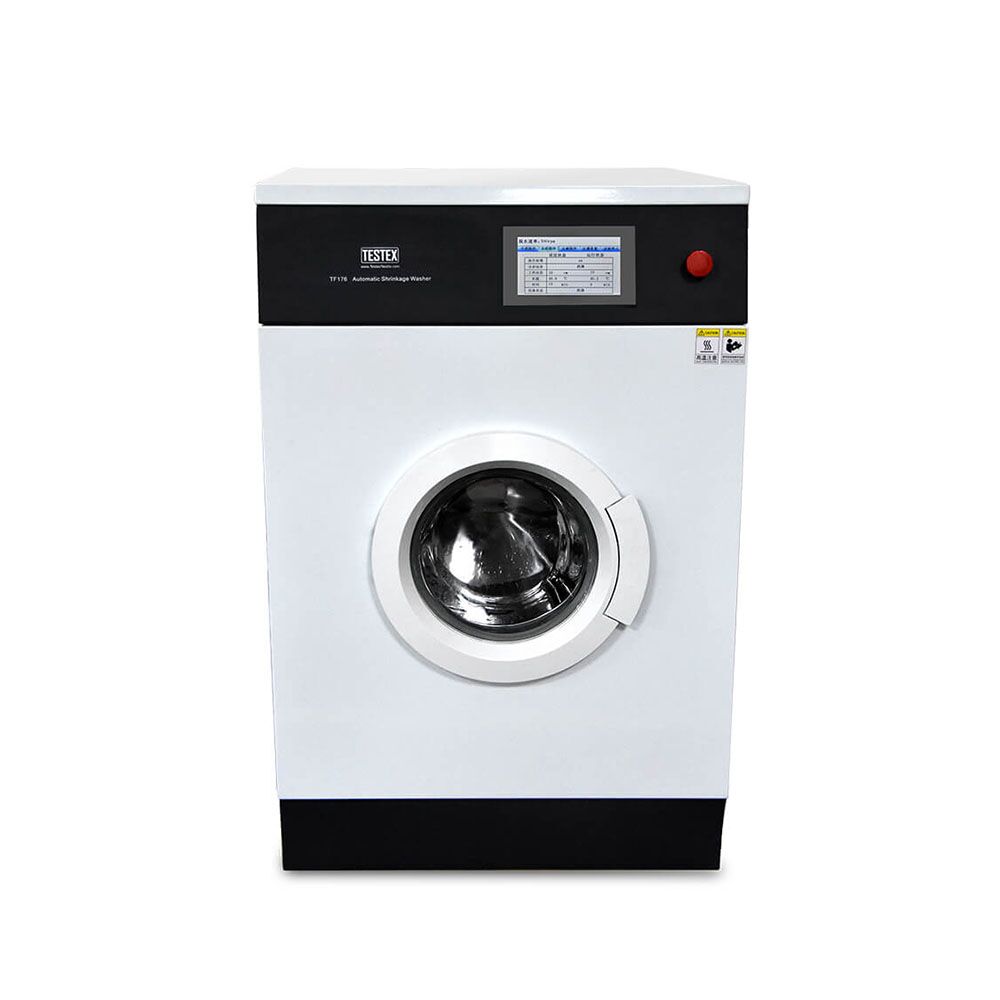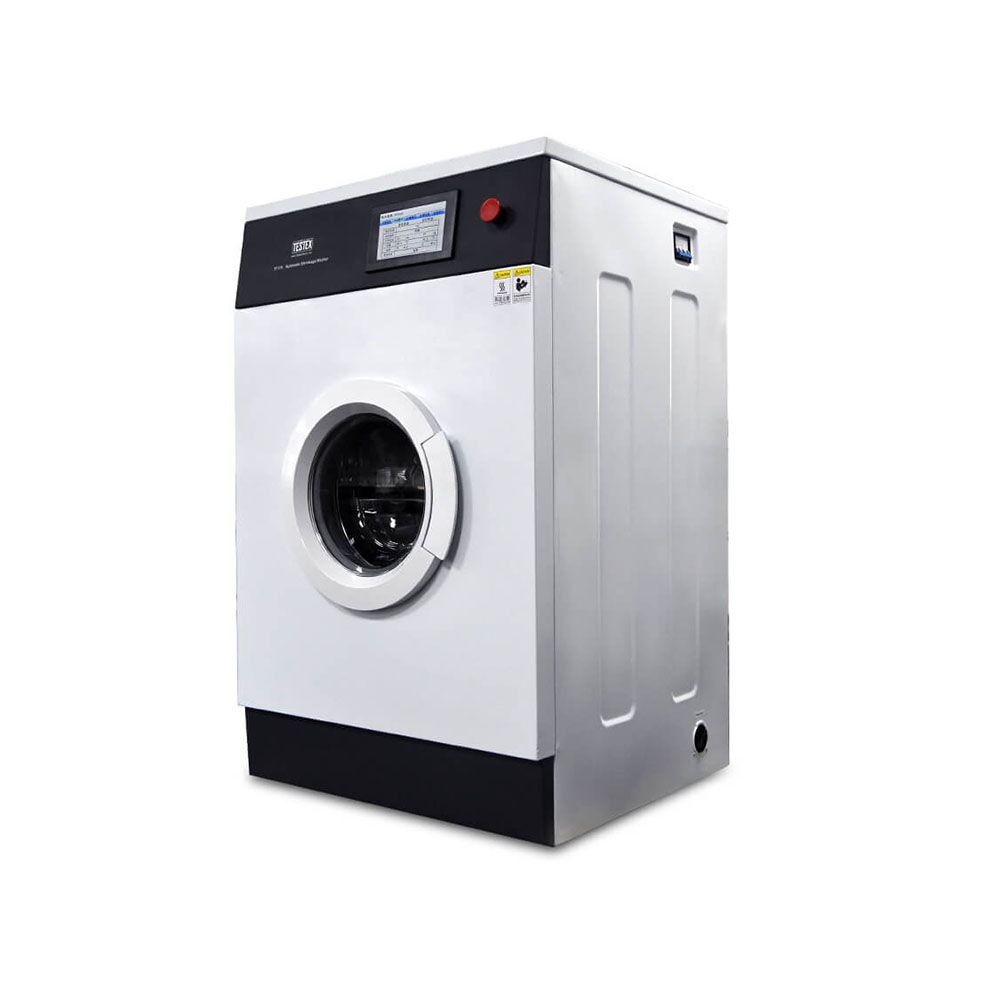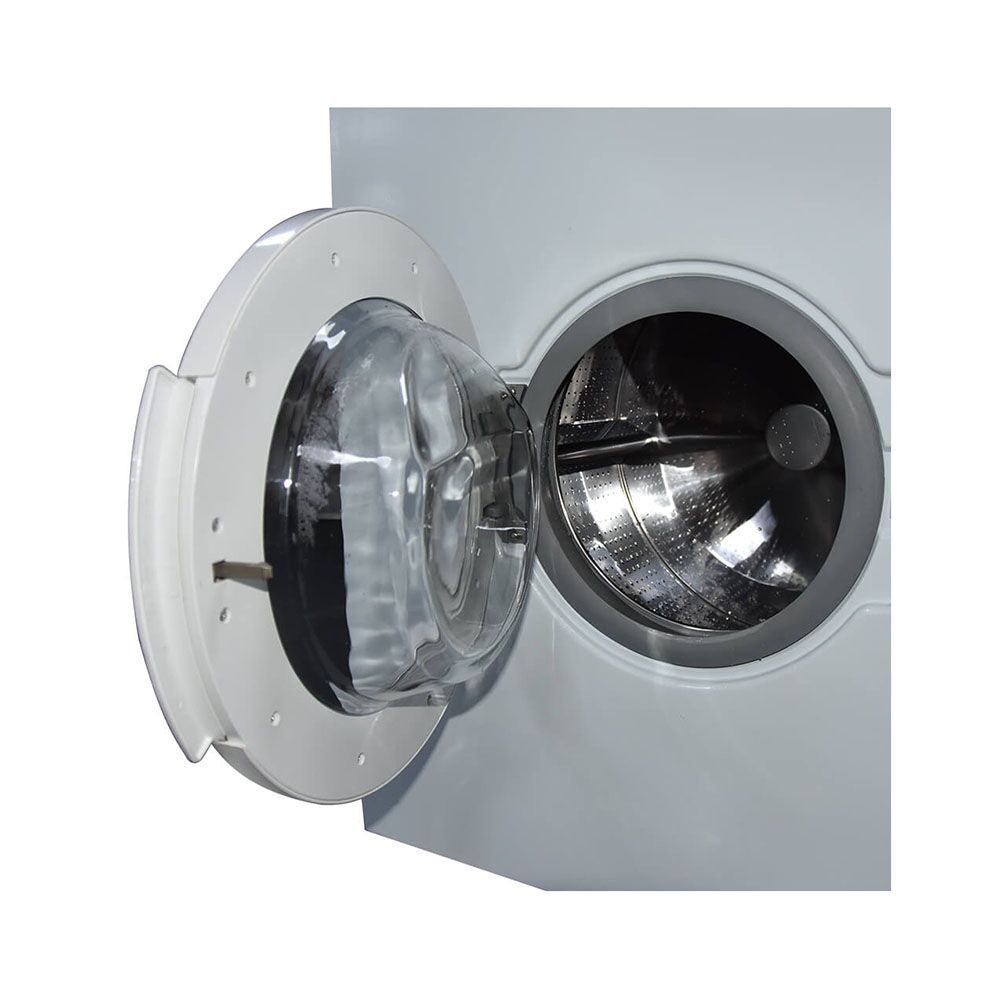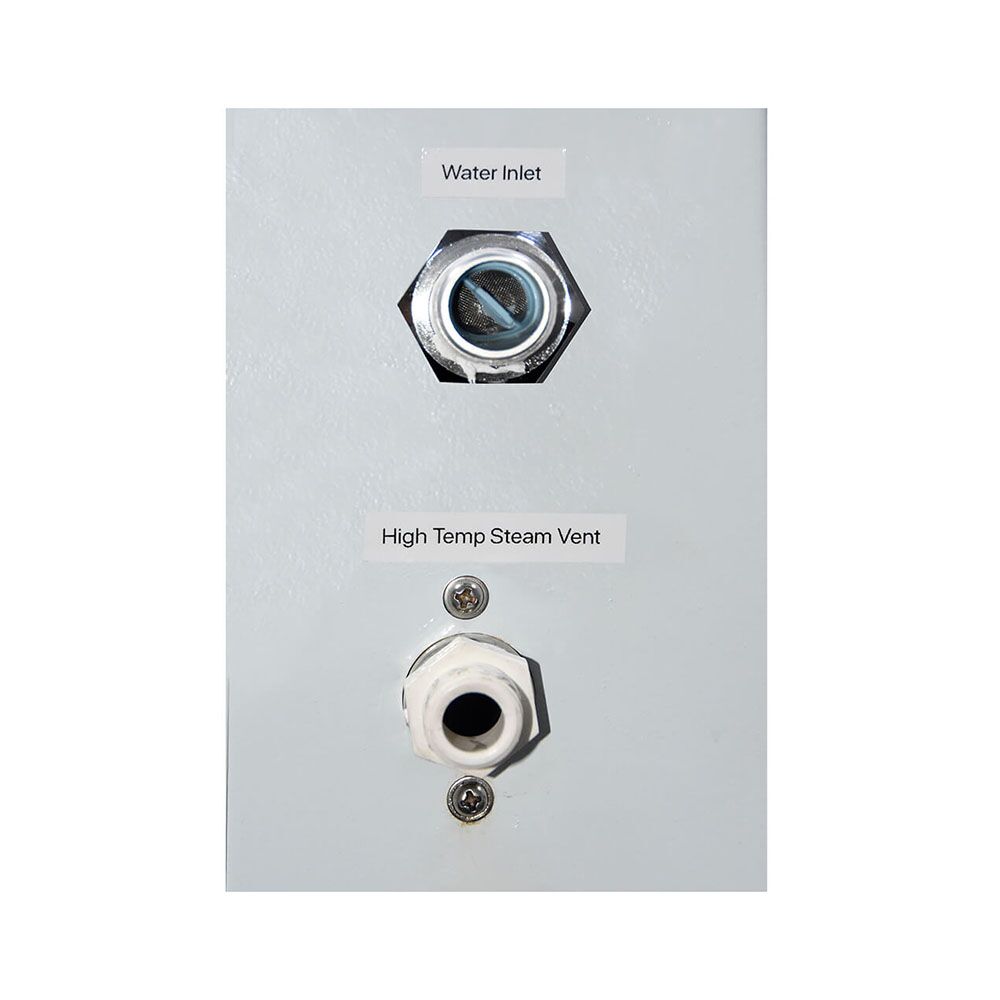Automatic Fabric Shrinkage Machine TF176
Fully Automatic Shrinkage Tester, used for testing the dimensional stability of fabrics, clothing, and other textiles after washing. Fully Automatic Shrinkage Tester complies with ISO 5077, ISO 6330, GB/T 8629, GB/T 8630, etc. The rated loading capacity of this fully automatic shrinkage machine is 5+/-0.05kg; with touchscreen control, it is a model with similar Functions to the Wascator.
Description
Application of Automatic Shrinkage Machine TF176
Automatic Fabric Shrinkage Machine TF176, or Fabric Shrinkage Washing Machine TF176, is used for testing the dimensional stability of fabrics, clothing, and other textiles after washing. The Automatic Fabric Shrinkage Machine is also suitable for textile enterprises, quality supervision agencies, commercial inspection agencies, and scientific research institutions to perform shrinkage and relaxation tests on cloth or other textiles such as cotton, animal fur, silk, linen, and chemical fibers after washing.
TESTEX also provides a series of fabric shrinkage rate testing machines.
The Features of Automatic Fabric Shrinkage Machine TF176
Flexible and diversified washing programs: The Fabric Shrinkage machine is equipped with 16 sets of standard-compliant “automatic washing programs”, and 8 wash programs that can be edited by yourself and separate manual control programs, which greatly expands its usage range.
Professional customization, durable: All mechanical systems of this Fabric Shrinkage Washer come from special customization of professional washing machine manufacturers, with mature design and high quality, which can withstand long time and high-intensity operation.
Accurate water level and high-speed spin factor: High-precision contact rod water level controller ensures accurate and reliable water level. Imported vector frequency conversion motor with high-speed dehydration factor.
Strong vibration resistance: The washing cylinder of this Fabric Shrinkage Machine is connected to the box with a high-performance damper, which keeps the box stable when the washing cylinder is rolling and vibrating violently, avoiding the whole machine from shaking. The textile shrinkage machine does not need to be fixed with foot bolts and can be moved and used anywhere.
Corrosion-resistant, beautiful, and high-grade: The inner and outer cylinders of the main machine are made of high-quality stainless steel, and so is the shell of the main machine. Therefore, it has a smooth and neat surface, an anti-corrosion function, and a beautiful appearance.
The fabric shrinkage machine adopts an LCD display to show the operation procedure and menu mode, etc., which is easy for users to control.
Specifications of Automatic Fabric Shrinkage Machine TF176
- Interior rowing box diameter 520 ± 1 cm
- Interior rowing box depth 315 ± 1 cm
- Inside and outside cylinder radial distance 1.7 ± 0.1 cm
- Number of lift sheets 3 pieces
- Raised wing height 5 ± 0.5 cm
- Revolution speed Washing 52r/min, Drying 500±20r/min
- Water Level Control low level = 10cm, high level = 13cm
- Temperature Detection Room temp. ~ 99℃±1℃, readability 0.1℃
- Heating power 5.4 ± 2% KW
- Rated loading capacity 5 +/- 0.05kg
- Rotating Speed 30 ~ 800 r/min(standard factory default speed is optional)
- Interior rowing box volume 70L
Weight of Automatic Fabric Shrinkage Machine TF176
| 200 kg |
Power of Automatic Fabric Shrinkage Machine TF176
| 220/110 V | 50/60 Hz | 6.5 kW |
Dimensions of Automatic Fabric Shrinkage Machine TF176
| Length: 750 mm | Width: 700 mm | Height: 1200 mm |
Standards of Automatic Fabric Shrinkage Machine TF176
| ISO 6330 | ISO 5077 | GB/T 8629 | GB/T 8630 |
Precautions for Operating Automatic Fabric Shrinkage Tester
- Please strictly adhere to the following scopes when setting parameters on this machine. Exceeding the scopes will invalidate the settings. When setting the water level, the user can only enter (10 or 13) cm, otherwise, it is invalid. When setting the water temperature, it can only be set within the range of normal operating temperature to 99°C, otherwise, it is not valid. When setting the washing time, rinsing time, cooling time, etc., the setting time can be within the range of 0 to 99 minutes.
- Ensure that mount the machine on a smooth and solid surface to avoid tilting and ensure proper operation.
- The inlet pipe must be secured for preventing water from seeping into the electrical components, which could leak and damage the components.
- Textile fabric fibers need to be removed from the filter frequently to ensure that the drainage pipe is unobstructed.
- No opening of the front round glass door when the machine is operating or when there is water in the barrel to avoid leaks and burns.
The test procedure for dimensional stability of textiles
A complete test procedure consists of a washing process and a drying process. So according to the purpose of fiber and fabric, washing can be divided into two parts: household washing and commercial washing. In general, clothes are generally washed using the home washing procedure. The main test procedures are as follows.
1 Make a specimen according to the standard and also mark it in the direction of length and width.
2 Prepare the automatic shrinkage washer and drying equipment, then select the appropriate testing method.
3 Pre-conditioning the specimen, then starting the test, and finally calculating the dimensional change.
Influencing factors for washing dimensional stability tests
The main influencing factors are the water temperature, the degree of agitation during washing, the washing time, and the drying method. The main manifestations are as follows.
Firstly, the higher the water temperature, the greater the shrinkage of the fabric.
Secondly, the longer the washing time, the greater the shrinkage of the fabric.
Thirdly, the greater the rotating speed of the automatic shrinkage washer, the greater the shrinkage of the fabric.
In addition, among the drying method, the shrinkage of the fabric is most significant when tumbling drying, while the shrinkage of the fabric is most minor when flat pressing.
Welcome to TESTEX – a professional textile testing instrument supplier – Automatic Fabric Shrinkage Machine TF176 is on sale, contact us to get a detailed price quote. If you want to know more about the fabric shrinkage standards, please feel free to contact us.
6 reviews for Automatic Fabric Shrinkage Machine TF176
You must be logged in to post a review.
Automatic Shrinkage Test Method
Test apparatus:
- Automatic shrinkage washer
- ECE non-phosphate detergent
- ICE non-phosphate detergent
- Drying oven
- Scale
- Sewing thread
- Needle
- Pen
- Fabric
Test piece preparation:
Choosing the smooth test piece, the size of it should be greater than 500mm*500mm. Or we can choose the length of the full width at least 500mm if the breath is less than 500mm. Three pairs of tags are marked along the warp and weft of the test piece, the distance between two tags should greater than 350mm, and the distance between the tag and the edge should greater than 50mm. On occasion, we can choose the test piece with 250mm*250mm, three pairs of tags are also marked along the warp and weft of the test piece, the distance between two tags is 200mm.
Test procedure:
- Pouring the detergent into the shrinkage washer, ECE non-phosphate detergent (without fluorescent brightener) and ICE nonphosphate detergent (with fluorescent brightener) are suitable for both type A and type B shrinkage washer.
- Putting the prepared test piece and dummy into the shrinkage washer, and selecting temperature, water-level and time and putting the prepared test piece and dummy into the shrinkage washer.
- After that, we can make the test piece dry in one of the following manners.
- Hang dry. We spread and hang the test piece on the laundry rack to dry it at room temperature.
- Drip dry. We spread and hang the test piece on the laundry rack to dry it at room temperature without spin.
- Lay flat. We flatten the test piece on the horizontal plate smoothly by hand (without any force of spread and twist).
- Flat pressing. We flatten the test piece on the press plate, set the suitable temperature and time, and record the temperature and press.
- Tumble dry. We can dry the test piece by cylinder dryer, and choose the low temperature for heat-sensitive fiber.
- Oven drying. We flatten the test piece on the screen mesh of the drying oven, and set the temperature of 60±5℃ (without any force of spread and twist).
Test measurement:
- The test piece is put on the table without any force of spread, and the shrinkage rate will be got by the ratio scale directly.
- The shrinkage rate can also be calculated from the length of three pairs warp and weft (accurate to 1mm) by the graduated scale, and put the average into the formula.
Test formula:
DC=(B-A)/A*100%
In the equation:
DC - The rate of dimensional change
A - The size before washing
B - The size after washing
A: Yes, Fully Automatic Shrinkage Tester TF176 belongs to this type.
Q: What is fabric shrinkage?
A: The shrinkage rate of textiles refers to the percentage of fabric shrinkage after washing or soaking.
The smallest shrinkage rate is synthetic fibres and mixed textiles, followed by woollen fabrics, linen fabrics, cotton fabrics in the middle, silk fabrics shrinkage is larger, while the largest is viscose fibres, man-made cotton, man-made wool type fabrics.




Linda Jim –
Great for my needs.
Murray Harrison –
Godds Received. I can complain nothing about it.
Josiah –
I appreciate this shrinkage tester, it is good for my lab’s test, especially for the result.
Dominic Symons –
Thanks, manufacturers of the auto-shrinkage tester. With the machine, our research goes more smooth.
testextextile –
We are so glad that you are contented with our machines. Expect our next cooperation.
Warner Louisa –
all ok. I’m satisfied . good seller. fast shiping.
Astrid Ruth.W –
Received very fast. Works as expected. Good communication with seller.
testextextile –
We are appreciate to communicate with you,looking forward to the next cooperation!:)